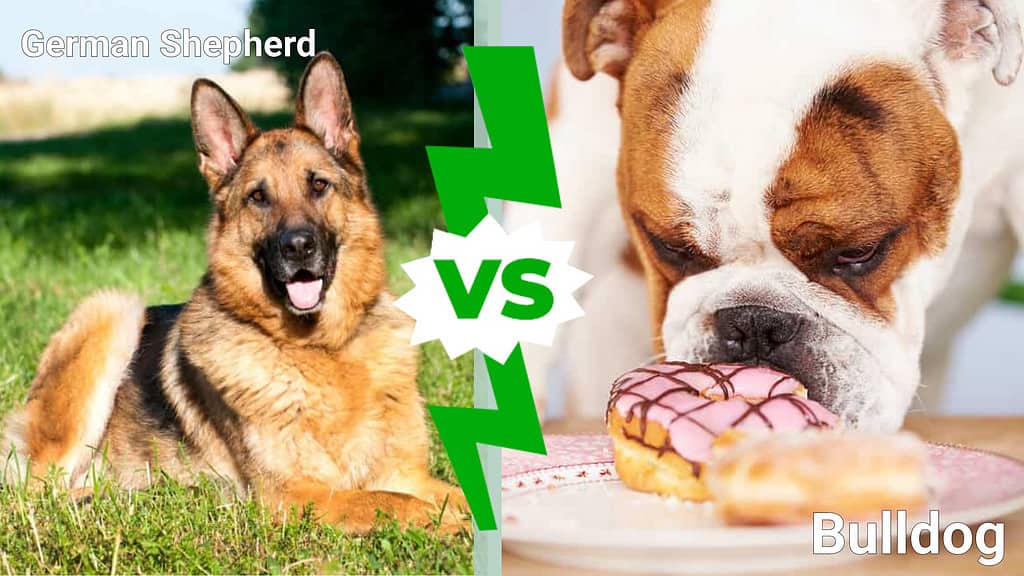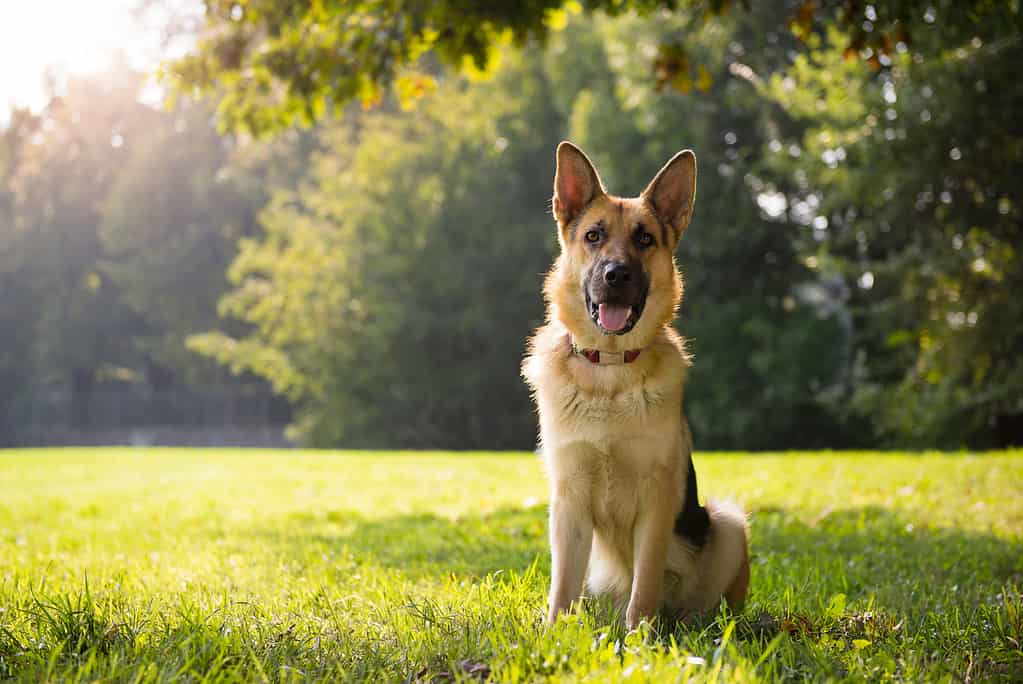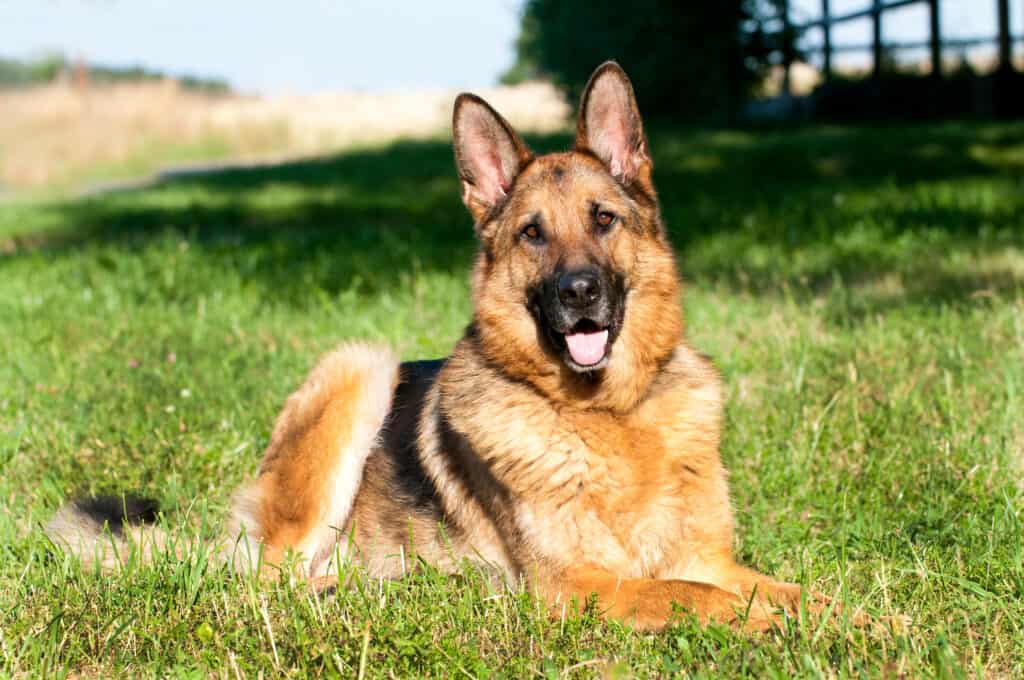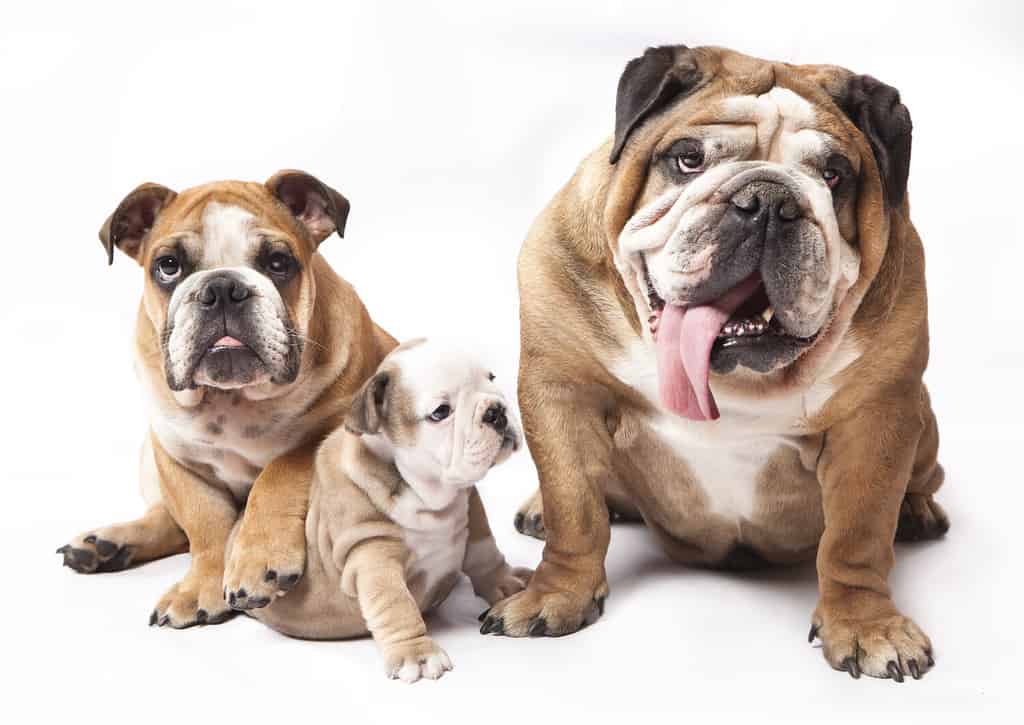You may be surprised at the differences between German Shepherds vs. Bulldogs! But despite their different appearances and temperaments, they also have so many similarities.
German Shepherds need much more exercise and make better guard dogs. Meanwhile, Bulldogs are easier to groom, shed less, and are (usually) friendlier toward strangers.
Of course, every individual dog will be different–these are just generalizations to help you get to know these breeds better.
In this article, we’ll discuss eight ways German Shepherds and Bulldogs are different and also some ways in which they’re similar to each other.
German Shepherd vs. Bulldog: A Comparison

| Key Differences | German Shepherd | Bulldog |
| Height | 22-26 inches | 14-15 inches |
| Weight | 50-90 pounds | 40-50 pounds |
| Coat | Mid-length double coat that sheds heavily | Short coat that sheds moderately |
| Temperament | Affectionate, can be guarded around strangers, protective, playful | Affectionate, friendly, playful, eager to please |
| Exercise Needs | Very high | Moderate |
| Trainability | Easy | Easy |
| Life Expectancy | 7-10 years | 8-10 years |
| Health Problems | Prone to joint problems, spinal issues, and GDV | Prone to breathing difficulties, brachycephalic airway syndrome, luxating patella, and heart problems |
Key Differences Between German Shepherds and Bulldogs

German Shepherds are bigger than Bulldogs and have longer coats.
©iStock.com/diego_cervo
The seven key differences between German Shepherds and Bulldogs are their heights, weights, coat lengths, temperaments, exercise needs, life expectancies, and common health problems.
German Shepherds are larger and have longer coats, while Bulldogs tend to be more outgoing and require less exercise. They have similar life expectancies, but Bulldogs live a little longer on average.
We’ll discuss all of these differences below, including common health problems in each breed.
Appearance

Bulldogs are shorter and stockier than German Shepherds.
©iStock.com/monkeybusinessimages
Height
Bulldogs are much more compact than German Shepherds. While German Shepherds stand 22-26 inches tall at the shoulder, Bulldogs are just 14-15 inches tall.
Taller dogs can sometimes get into more mischief, such as counter-surfing! They can also be easier to pet since they’re right at waist level.
Weight
Though Bulldogs are stocky, they don’t usually weigh as much as German Shepherds. The largest Bulldogs are 50 pounds, while that’s the size of the smallest German Shepherd. Most of them range from 50-90 pounds.
Weight matters when it comes to dogs because it costs more to feed and vet larger pups. It can also be more difficult to handle them on a leash if they pull or lift them in emergency situations.
They’ll also squish you easier if they decide to be “lap dogs” despite their large size!
Coat
German Shepherds shed more than Bulldogs and have longer fur. Their shedding especially ramps up during shedding season twice yearly.
They should be brushed every few days to prevent matting and to control the amount of shed fur you find around the house.
The following are the German Shepherd coat colors accepted by the AKC breed standard:
- Black
- Black and cream
- Black and red
- Black and silver
- Black and tan
- Gray
- Sable
- White
- Liver
- Blue
- Bi-color
Comparatively, here are the colors accepted by the AKC breed standard for Bulldogs:
- Fawn
- Fawn and white
- Fawn brindle and white
- Red
- Red and white
- Red brindle
- Red brindle and white
- White
- Fawn and brindle
- Fallow
Bulldogs have short coats that shed moderately throughout the year and heavier during the shedding season in the spring and autumn. They need a quick brushing occasionally to remove shed fur.
Characteristics

German Shepherds have stronger guarding tendencies.
©Dora Zett/Shutterstock.com
Temperament
Both breeds are affectionate and eager to please. They’re loyal and dedicated to their families!
German Shepherds have stronger guarding tendencies and may be wary of strangers, while Bulldogs tend to be friendly toward strangers and don’t make the best guard dogs.
While both breeds are playful, German Shepherds have much more energy and working drive.
Early socialization is important in both breeds, as is teaching manners such as not jumping on people.
Social needs
German Shepherds and Bulldogs can both be clingy and do best in homes where people work opposite shifts. That way, someone is home with the dog most of the day, and they never spend too long alone.
They can both make good family dogs so long as they’re trained to behave around children, and children are taught to respect a dog’s boundaries as well. Never leave children and dogs together unsupervised.
When it comes to other pets, German Shepherds have a strong prey drive and may be dangerous around cats or small dogs. However, it depends on the individual dogs, their prey drive, and how they’re raised.
Exercise Needs
German Shepherds are high-energy, working dogs. They require tons of exercise and mental stimulation throughout the day–it’s so, so important to work their minds!
Bulldogs are less active and are often content to lounge around the house when not playing or going on walks. Like all dogs, they need moderate exercise to stay fit and healthy.
Watch your Bulldog carefully during intense exercise and in the heat, as they’re prone to breathing difficulties and heat stroke. In the summer months, you may need to keep them indoors or limit walks to cooler times of the day.
Trainability
Luckily, both breeds are people pleasers! They’ll still need plenty of training and won’t listen 100% of the time, but for the most part, they’ll really want to make you happy.
German Shepherds are incredibly smart and will likely learn new tasks more quickly than Bulldogs.
Always make sure to use force-free training methods only, never aversive or punishment-based methods.
Health Factors

English Bulldogs live slightly longer than German Shepherds on average.
©Liliya Kulianionak/Shutterstock.com
Life Expectancy
Bulldogs live a bit longer, with an average life expectancy of around 8-10 years. However, German Shepherds are close at 7-10 years.
A few ways to help your dog live longer, no matter their breed, include:
- Adopting from a reputable breeder who completes recommended genetic health screenings
- Visiting the veterinarian regularly for check-ups and anytime your dog is sick
- Feeding a quality, veterinarian-recommended diet
- Ensuring your dog gets the amount of daily exercise required for their breed
Health Problems
Bulldogs are, unfortunately, very unethically bred. Their short snouts cause the majority of health issues associated with the breed, including difficulty breathing, increased risk of heat stroke, and other complications of brachycephalic airway syndrome.
They’re also prone to luxating patella and heart problems.
German Shepherds are prone to joint issues, which are also often caused by poor breeding seen in show lines with sloped backs. Other common health problems seen in the breed include degenerative myopathy and gastric dilatation-volvulus, also known as GDV or bloat.
Before adopting a German Shepherd or any other breed prone to bloat, it’s vital to learn its symptoms. Dogs will have swollen, painful abdomens and may retch or drool excessively. They may become restless or go into a “downward dog” position.
Bloat is a deadly emergency condition that requires an immediate trip to the vet. Even with veterinary care, 30% of dogs with bloat die.
You can decrease your dog’s risk for bloat by avoiding raised feeders and not exercising them directly before or after they’ve eaten a large meal or drank a large amount of water. Use slow-feeder bowls to slow your dog’s eating and avoid stress, especially around mealtimes.
Wrapping Up: German Shepherd vs. Bulldog
When it comes down to making a decision between a German Shepherd vs. a Bulldog, everyone’s choice will be different. It depends on your lifestyle and what you want from your dog.
While they’re both often seen as guarding breeds, Bulldogs are actually pretty stranger-friendly and usually don’t have strong guarding instincts.
Both are affectionate and can suffer if left alone for too long, so they require families who can be with them most of the day. They’re easy to train and incredibly loyal!
If you want a dog to exercise with, a German Shepherd is the best choice. If you prefer to sit on the couch (but are also willing to commit to exercising a pup daily), you’d likely prefer a Bulldog.
Both breeds are great for those who want to rescue a dog from a shelter, rescue, or rehoming situation. However, I highly recommend against purchasing from a Bulldog breeder since they’re bred unethically.
In the end, both are great dogs–just different! I hope this article has helped you to choose the best one for you, or maybe you’ll choose to look at other great breeds.
Thank you for reading! If you have feedback on this post, please contact the AZ Animals editorial team.
Ready to discover the top 10 cutest dog breeds in the entire world?
How about the fastest dogs, the largest dogs and those that are -- quite frankly -- just the kindest dogs on the planet? Each day, AZ Animals sends out lists just like this to our thousands of email subscribers. And the best part? It's FREE. Join today by entering your email below.
Thank you for reading! Have some feedback for us? Contact the AZ Animals editorial team.








